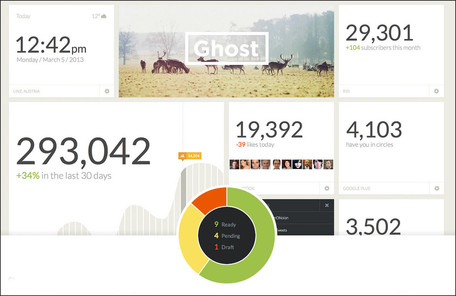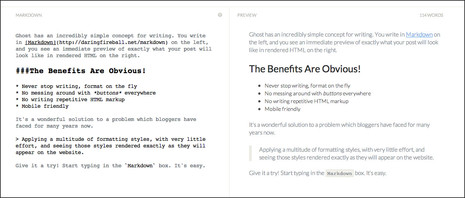
Ghost, a publishing platform created by website designer John O'Nolan, has been causing quite a stir among tech websites and the blogging community.
"Ghost aims to reboot blogging," said Duncan Geere of Wired. At TechCrunch, John Biggs was so enamoured with how "darn beautiful" the platform looks that he said it would take blogs to "the next astral plane".
Having built sites for the likes of Microsoft, Virgin Atlantic, Nokia and more, as well as being the deputy head of the user interface team at WordPress, O'Nolan says he became "very aware" of the limitations of some blogging platforms and how complicated some of the editors had become.
"I'd been thinking about what it would look like if it started completely from scratch," O'Nolan told Journalism.co.uk, adding that he "mocked it up in Photoshop one day, put it all together and chucked it on my blog and that was the beginning of all of this".
After six months of development, the project took to crowdfunding platform Kickstarter. Within 12 hours it had exceeded the initial £25,000 target.
Now, just over halfway through the month-long crowdfunding campaign, the platform has exceeded the initial target five times over, is backed by such digital luminaries as Seth Godin, has an advisory board including founding members of Mashable, WooThemes and Problogger and is pushing hard to reach its stretch goals (targets set by a project once it has already reached its initial funding amount).
For the blogger, the main intent of Ghost is to simplify the experience of writing and publishing. By reducing the vast number of menus, buttons and functions that are inherent to many publishing platforms, Ghost is both more focused to provide what a blogger needs and more intuitive for first-timers, O'Nolan says.

The dashboard allows all the analysis and social media data to be viewed in one place, with an option to customise the page to whichever widgets or statistics they feel are most relevant to them.
In terms of writing, O'Nolan says the process is again simplified by removing the stop-start nature of formatting through HTML or button-clicking.
"Neither of those are really ideal for a writer for the web for the 21st century," said O'Nolan, "because both of them take your focus off the content and on to formatting which becomes a kind of chore."
Ghost approaches this problem in two ways. Firstly, by showing the editor on the left and a real-time preview on the right, it removes having to go back and forth between the two to double-check the final version is presentable.
Secondly, the editor uses Markdown to streamline the formatting process for writers. So instead of leaving the process of writing the text, to click on a bullet point tab or enter the HTML code, a user can simply enter a star and carry on writing. Or for different heading sizes enter the relevant number of hash symbols: # for Heading 1, ## for Heading 2 and so on.
"So what it does it allows you to push one or two buttons, one or two keys on your keyboard and then keep typing, keep writing your ideas, keep going," said O'Nolan. "So it's this idea of trying to provide an experience or a writing experience that's tailored to what people need on the web and that lets writers just write without thinking about all the things that need to surround it."

For developers, O'Nolan says the platform will be entirely JavaScript based and function in much the same way as WordPress in terms of creating themes and plugins.
Not only that, but the open-source nature of the platform means that developers can make any adaptations they feel necessary to suit different needs and O'Nolan is particularly excited to see how Ghost can explore collaboration between multiple authors of an online publication.
"It could be potentially very exciting," he said. "You didn't know what apps were going to be on the iPhone when that launched because the ecosystem didn't exist yet and the same with WordPress and its plugins and themes. It could go in any number of directions and the most important thing for us was to create a viable platform that allows people to explore their own ideas and their own creativity for building things around publishing and around content."
Ghost will offer a hosting service, for which it will charge at various prices depending on the level of service, but an important distinction that O'Nolan believes is central to the platform is that it is non-profit.
"Non-profit doesn't mean non-revenue," he stressed. "It will definitely be a business that makes money that turns a profit, technically speaking, but the difference is it won't be paying out that profit to shareholders or directors."
Any money the platform makes will be re-invested in the company to find new ways to improve the service and expand on the infrastructure that it runs on.
The Kickstarter campaign for Ghost ends on May 28, with the platform expected to roll out to high-end backers in June and all Kickstarter backers in August. It is expected to be fully public by January 2014.
Free daily newsletter
If you like our news and feature articles, you can sign up to receive our free daily (Mon-Fri) email newsletter (mobile friendly).
Related articles
- 200 speakers you need at your next journalism event to avoid all-male panels
- Five alternatives to journalism internships
- 10 portfolio and publishing platforms for freelancers
- Newly launched news co-operative wants to boost local journalism in Leicester
- 30 Medium publications about journalism to follow









